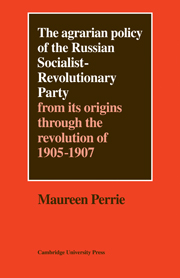 The Agrarian Policy of the Russian Socialist-Revolutionary Party
The Agrarian Policy of the Russian Socialist-Revolutionary Party Published online by Cambridge University Press: 07 October 2011
The beginning of the twentieth century ushered in a period of widespread social unrest in Russia. From the end of the 1890s there was a steady increase in student disorders in the universities, a growing strike movement in the industrial centres, and peasant disturbances in the countryside. All of these trends were to culminate in the revolutionary upheavals of 1905.
The underlying causes of the peasant movement which broke out in 1902 were economic. By the provisions of the Emancipation Act of 1861, the peasants received less land than they had previously used under serfdom, and an unprecedented increase in the size of the rural population in the second half of the nineteenth century intensified the problem of ‘land-hunger’. Heavy redemption payments on their communal holdings, in addition to an onerous burden of direct and indirect taxation, increased the impoverishment of the peasantry. The inadequacy of his allotment to meet his obligations forced the peasant either to rent or to purchase land from the gentry, or to seek off-farm wage-labour in agriculture or industry. The pressure of population increase, however, pushed land prices and rents up, and kept wages low. The economic dependence of the peasantry on the gentry landowners was therefore on the increase in the decades after Emancipation. Those of the gentry who retained their land at the end of the century either rented their estates to the neighbouring peasantry or went over to more capitalistic methods of farming.
To save this book to your Kindle, first ensure no-reply@cambridge.org is added to your Approved Personal Document E-mail List under your Personal Document Settings on the Manage Your Content and Devices page of your Amazon account. Then enter the ‘name’ part of your Kindle email address below. Find out more about saving to your Kindle.
Note you can select to save to either the @free.kindle.com or @kindle.com variations. ‘@free.kindle.com’ emails are free but can only be saved to your device when it is connected to wi-fi. ‘@kindle.com’ emails can be delivered even when you are not connected to wi-fi, but note that service fees apply.
Find out more about the Kindle Personal Document Service.
To save content items to your account, please confirm that you agree to abide by our usage policies. If this is the first time you use this feature, you will be asked to authorise Cambridge Core to connect with your account. Find out more about saving content to Dropbox.
To save content items to your account, please confirm that you agree to abide by our usage policies. If this is the first time you use this feature, you will be asked to authorise Cambridge Core to connect with your account. Find out more about saving content to Google Drive.